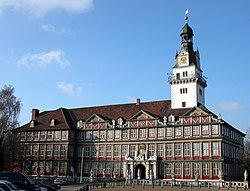Wolfenbuttel
| Wolfenbüttel | ||
|---|---|---|

Wolfenbüttel Castle
|
||
|
||
| Coordinates: 52°09′44″N 10°32′13″E / 52.16222°N 10.53694°ECoordinates: 52°09′44″N 10°32′13″E / 52.16222°N 10.53694°E | ||
| Country | Germany | |
| State | Lower Saxony | |
| District | Wolfenbüttel | |
| Government | ||
| • Mayor | Thomas Pink (CDU) | |
| Area | ||
| • Total | 78.46 km2 (30.29 sq mi) | |
| Population (2015-12-31) | ||
| • Total | 52,269 | |
| • Density | 670/km2 (1,700/sq mi) | |
| Time zone | CET/CEST (UTC+1/+2) | |
| Postal codes | 38300, 38302, 38304 | |
| Dialling codes | 05331 | |
| Vehicle registration | WF | |
| Website | www.wolfenbuettel.de | |
Wolfenbüttel is a town in Lower Saxony, Germany, the administrative capital of Wolfenbüttel District. It is best known as the location of the internationally renowned Herzog August Library and for having the largest concentration of timber-framed buildings in Germany. It is an episcopal see of the Evangelical Lutheran Church in Brunswick. It is also home to the Jägermeister distillery and houses a campus of the Ostfalia University of Applied Sciences.
The town centre is located at an elevation of 77 ft (23 m) on the Oker river near the confluence with its Altenau tributary, about 13 km (8.1 mi) south of Brunswick and 60 km (37 mi) southeast of the state capital Hanover. Wolfenbüttel is situated about half-way between the Harz mountain range in the south and the Lüneburg Heath in the north. The Elm-Lappwald Nature Park and the Asse hill range stretch east and southeast of the town.
With a population of about 52,000 people, Wolfenbüttel is part of the Hannover–Braunschweig–Göttingen–Wolfsburg Metropolitan Region. It is the southernmost of the 172 towns in Northern Germany whose names end in büttel, meaning "residence" or "settlement."
The mayor of the town Wolfenbüttel is since 2006 Thomas Pink (CDU). He was reelected in 2014 with 67.7% of the vote.
A first settlement, probably restricted to a tiny islet in the Oker river, was founded in the 10th century. It was mentioned in 1118 as Wulferisbuttle, when the Saxon count Widekind of Wolfenbüttel had a water castle erected on the important trade route from Brunswick to Halberstadt and Leipzig. Destroyed by Henry the Lion in 1191 and again by his great-grandson Duke Albert I of Brunswick-Lüneburg in 1255, the fortress was acquired and rebuilt by the Welf duke Henry I of Brunswick from 1283 onwards.
...
Wikipedia




